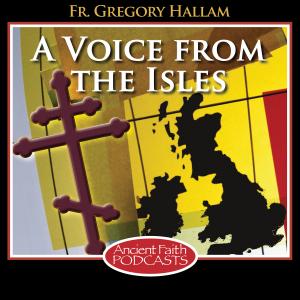A Voice from the Isles

Reflecting the Image, Growing by Grace
This morning we gather together to pray as an Orthodox Christian community, to receive Holy Communion, and to celebrate one of the most important feasts of the Orthodox Church year—the Annunciation to the Theotokos and Ever Virgin Mary. Now, an annunciation is an announcement, a proclamation of a message. This announcement to the Theotokos from the Archangel Gabriel is one of the most important announcements in human history. And the announcement—the message—is not only to Holy Mary that she is The Theotokos, but a message to each of us that our lives, like the life of Holy Mary, can be suddenly and unexpectedly changed because of the intervention of Christ guiding us to His purposes. How? How can we let Christ intervene in our lives and guide us to His purposes? An English poet, Philip Larkin (1922-1985) has written in his short poem, “The Trees,” about how trees grow each year. I find his words help me (and perhaps you) to understand how Holy Mary might have felt when the Archangel Gabriel visited her to leave his important message. Larkin wrote in June 1967: “The trees are coming into leaf/ Like something almost being said;/ The recent buds relax and spread,/ Their greenness is a kind of grief./ Is it that they are born again/ And we grow old? No, they die too,/ Their yearly trick of looking new/Is written down in rings of grain./ Yet still the unresting castles thresh/ In full-grown thickness every May./ Last year is dead, they seem to say,/ Begin afresh, afresh, afresh.” It is the final words that possibly catch Holy Mary’s experience, when the leaves “seem to say, begin afresh, afresh, afresh.” That is the response of The Theotokos to this unexpected message from Archangel Gabriel—she begins afresh with the words: “Behold the handmaid of the Lord; let it be to me according to your word.” Now, a handmaid or handmaiden is defined by the dictionary as “someone that serves a useful but subordinate purpose.” So Holy Mary is not saying, “I am honoured! Look at me my Jewish brethren. I have within me The Messiah!” No, she is saying simply, “The Messiah—whom we know today as the Christ, the Annointed One—has come into the world; and I have a small role in his coming.” It is that modesty and immediate humility of Holy Mary that enables the whole of humanity to begin afresh, as she shares her humility and honesty with us. In the Stichera of the Annunciation, read today before the Divine Liturgy, the words of Archangel Gabriel are given a poetic interpretation: “Gabriel came and stood before you, maid, and in greeting said, ‘Rejoice, burning bush that remains unconsumed; rejoice unsearchable depth; rejoice bridge that leads to heaven; rejoice ladder raised on high that Jacob saw; … rejoice, restoration of Adam, the Lord is with you [end of quote].” So Gabriel’s greeting to Holy Mary has become a bridge that leads her and us to heaven—a bridge that enables us to cross over from the secular life of the contemporary world to the possibility of a life in unity with Christ. A fourth century preacher and archbishop, St Peter Chrysologus, reminds us that the Archangel Gabriel greeted Holy Mary with the words, “The Lord is with you.” And St Peter Chrysologus asks: “Why is the Lord with you?” He answers his question with the insight, “Because [the Lord] is coming to you not merely to pay a visit, but He is coming down into you in a new mystery, that of being born.” That is very important, because the Lord comes to each of us, just as He came to Holy Mary—not “merely to pay a visit,” but He comes down to us in baptism to be born within us. As Theodore of Mopsuestia, the fourth century founder of the Antiochene School of Biblical interpretation, has written in his Catechetical Homilies: “Christ has given us in holy baptism regeneration, and by this He makes us His own body, His own flesh, His offspring.” Regeneration is defined by the dictionary as “to give new exis






 Visit Podcast Website
Visit Podcast Website RSS Podcast Feed
RSS Podcast Feed Subscribe
Subscribe
 Add to MyCast
Add to MyCast